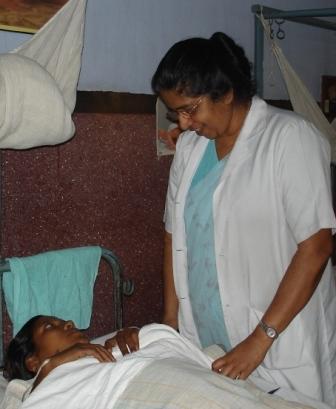Over the past two hundred years or so, Catholic Nuns and other women changed Bihar
In the year 1852, five single women travelled all the way from Bombay to Patna, doing the last few days on a bullock-cart through thick jungles. These were the German nuns, belonging to the order of the Institute of the Blessed Virgin Mary. They came from Munich to Bombay. They left Bombay in early September 1852 and reached Patna around February 1853. A five month journey by bullock-cart. These five nuns were Sisters Maria Groeppner, Angela Hoffman, Aloysia Maher, Antonia Feth and Catherine Schreibman. They established the first modern school for girls in Bankipore in 1853, on the bank of River Ganges. St. Joseph’s Convent High School, as it is now known as, was the very first day and boarding school for girls, and students came from all over, even from the noble families of Nepal.
From that small beginning, hundreds of Catholic women, most of them religious, have been a part of Bihar’s growth, serving the people in the fields of education, health, and rural development.

As we prepare to mark yet another International Women’s Day, the Catholic community in Bihar have more than one reason to be proud of the contribution they have made to the progress of women in the state. This year, the Archdiocese of Patna celebrates 100 years of its existence, but the Catholic missionaries and the small Catholic community have a presence in the region for over two centuries.
Health services
In 1939, another Catholic woman, Mother Anna Dengel, the founder of the Medical Mission Sisters came to Padari ki Haveli. and she set up the Holy Family Hospital. Thousands of women in Bihar, from the poorest of the poor to the well off now had affordable, compassionate, and professional access to health.
In 1948, another band of courageous women started up the Nazareth Hospital in Mokama, providing health services and treatment to all.
Catholic nuns continue to contribute to the medical needs of thousands in dispensaries and health centres in various locations across Bihar. Along with the nuns, several catholic girls and women serve on the hospital administrative and nursing staff, each one contributing to improving the health of ordinary Biharis.
It is not an exaggeration to say that in Bihar, the first hospitals to welcome the HIV and AIDS related cases, were the Kurji Holy Family Hospital community centres and Nazareth Hospital in Mokama.
Schools and Higher Education
In 1940, the sisters of the Apostolic Carmel, yet another band of pioneering women from Mangalore brought higher education to women when they started up the Patna Women’s College. This was the very first college for women in Bihar, and is a constituent college of Patna university. One just has to look back over the years, and take note of the number of PWC students who have made Bihar and India proud!
The sisters of Notre Dame opened up schools in Munger and Patna district.
The very first Television training centre in the state was set up in 1977 by a Catholic woman. She was Sister Peter Claver of the Sisters of Notre Dame, who was also the first mass media teacher/trainer in Bihar. NDCC, the Notre Dame Communication Centre trained the early Doordarshan people, and several TV personnel owe their training to this American woman’s initiative.
The Holy Cross sisters have one of the best known education centres for children with special needs. The hearing impaired, the sight impaired, and the physically and mentally challenged children are all welcomed at Asha Deep. The going is tough, but the Holy Cross sisters and their team of trained and compassionate teachers and trainers have made their mark in the state.
Women and Empowerment
The very first campaign for women’s education and empowerment within the Bihar education system was formulated in 1992, with the evolution of the Bihar Education Project. Bihar Mahila Samakhya Society was born, and the first state project officer was Sister Sujitha SND, a Catholic Nun. At the time, eyebrows were raised within the Catholic community, and some people were of the opinion that a nun should not accept a post on a government body. The pioneering directors of the Mahila Samakhya Movement, which directly contributed to the educational and economic uplift of lakhs of women were two nuns: Sisters Sujitha and the late Sister Sabina SND. These two religious sisters trained and inspired their teams to reach out to the poorest f the poor. Mahila Samakhya women stood up to inequality and domestic violence within their own homes and village communities. A book can be written about their experiments, adventures, and successes.
Another well known figure in the struggle for women’s emancipation is Sudha Verghese, who was awarded a Padmashri for her work with the women of Dalit communities, and who has also served on the Bihar Minorities commission.
The safety and protection of Adivasi women brought to the city as domestic workers was pioneered by Sister Maggie, as she is affectionately called, and work continues to this day, with the domestic worker’s union being one of the important anti-trafficking organisations. Catholic nuns in several congregations in Bihar work with women, helping and empowering them.
On this International Women’s Day, it would be appropriate for Bihar’s miniscule Catholic Community to honour and celebrate the strength and courage of their religious sisters, and for all to acknowledge the contribution of these women to the progress of Bihar.


